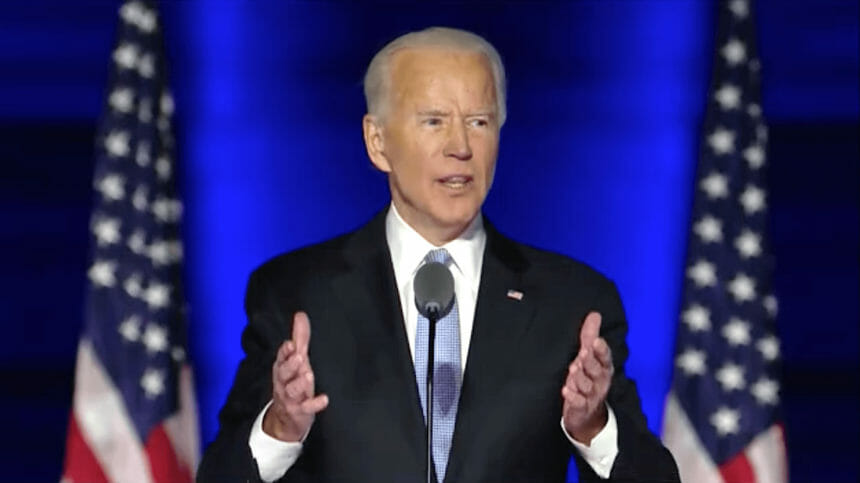
With the presidential election over and former Vice President Joe Biden the projected winner, senior living industry association leaders say they are optimistic about future efforts related to the battle against COVID-19 and are taking proactive steps to ward off any potential attempts to regulate the industry at the federal level.
American Seniors Housing Association President David Schless noted that Biden, a Democrat from Delaware, “has made COVID-19 and caregiving a national priority and has announced his intention to launch a COVID-19 Task Force that will create an ‘action blueprint’ to begin implementation Jan 20.” The president-elect is expected to announce members of that task force today.
Controlling the pandemic was a top priority for those voting for Biden, according to many analysts, noted Argentum President and CEO James Balda.
“Argentum continues to focus on COVID-19 and educating federal officials about the importance of processing relief payments, obtaining additional financial resources and testing support, preparing vaccine management, and instituting reasonable liability protections,” he said.
And those efforts won’t wait until the Jan. 20 inauguration. An additional legislative package with pandemic relief could be passed during the lame duck session of Congress between now and the start of a new administration, Schless said. Democrats now may be more willing to work with Republicans on the issue, he noted.
“It is clear that a relief package is necessary, but the amount of relief remains the sticking point,” Schless said. “There is incentive on both sides of the aisle to clear the deck on this issue, and Sen. McConnell has committed to address a stimulus package in the coming weeks. We are optimistic that additional Provider Relief Funding and limited liability protections will be parts of that package.”
Balda also said that Argentum will continue to fight for “meaningful and reasonable” liability protections during the lame duck session.
The new administration also will focus attention on caregiver wages, paid sick leave, a more robust testing and contact tracing program, and ensuring that adequate supplies are available to essential staff, Schless predicted.
“It will be critical for ASHA to engage early in this process to educate Biden’s team about the benefits of senior living to the overall health-care system during this pandemic,” he said.
Biden, as president, also could reverse some of Trump administration policies, such as those related to immigration, to help address workforce shortages in the industry, Schless said.
Assisted living operators now ‘healthcare providers’
The assisted living industry welcomed financial and testing assistance from the federal government to help fight the coronavirus, even as it brought more attention to operators, now labeled by the federal government as “healthcare providers.”
Earlier this year, two U.S. senators and one congresswoman introduced the Assisted Living Facility Coronavirus Reporting Act to address issues related to COVID-19 infections, hospitalization and fatality rates, sick leave policies for employees, testing and personal protective equipment in senior living communities. They proposed the legislation after soliciting information from 11 senior living companies about the extent of the coronavirus in their buildings and the actions they took to prevent or mitigate the disease. It has not been passed.
Balda predicted “new legislative proposals and executive actions to exercise further control of the industry” in the new year but said that Argentum “is committed to combating efforts to increase onerous regulation and federal oversight from both sides of the aisle.”
The association is continuing to invest in government relations efforts and is creating new avenues to share messages, he said.
National Center for Assisted Living Executive Director Scott Tittle previously told McKnight’s Senior Living that although he has not heard of any specific calls for any additional changes in regulations related to assisted living, he knows it’s a possibility.
“We look forward to seeing the outcome of the elections and then working with the new Congress to see what we may be able to do by way of addressing any questions,” he said in mid-October.
Now, it’s clear that the Democrats will have a majority in the House, although control of the Senate will not be known until Jan. 5 due to two run-off elections in Georgia. “The parties will have to work together,” Schless predicted.
“A divided Congress,” Balda said, “may prove helpful in our efforts to prevent overly burdensome regulation to the industry.” Most of the legislation introduced to regulate the assisted living industry is led by Democrats, he noted.
The overall results of the elections could be more telling for the assisted living industry than solely who occupies the White House, Tittle previously said.
“If the Democrats control the House, the Senate and the White House, there certainly could be a different set of questions,” he said. But if election results lead to Republicans remaining in the majority in the Senate and Democrats remaining in the majority in the House, then “we might have a very similar atmosphere as we’ve had the last few years, COVID aside,” regardless of who becomes president.

